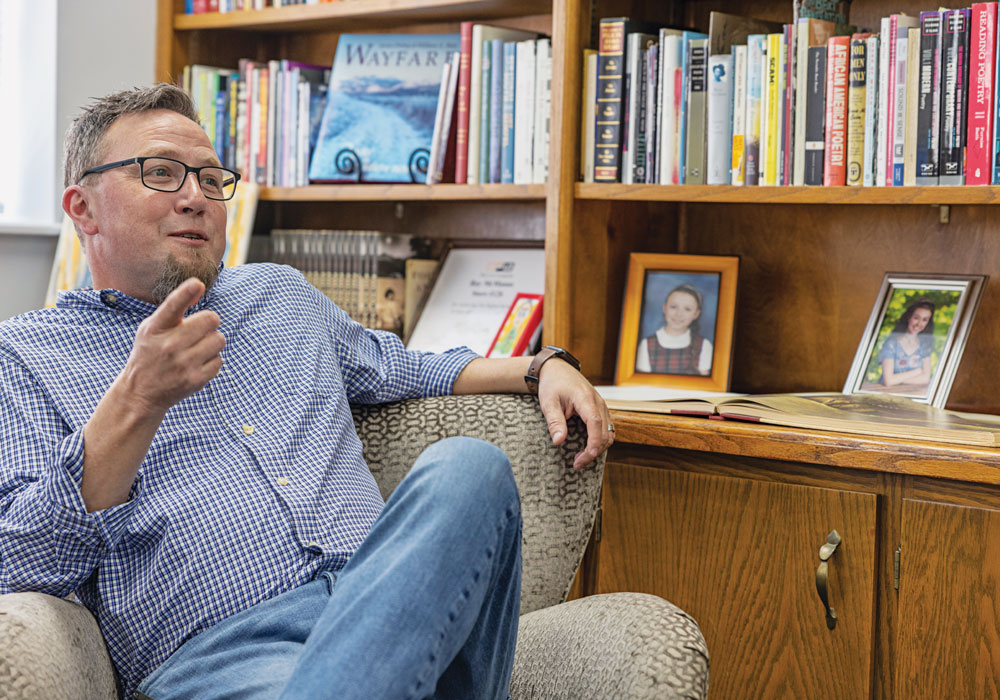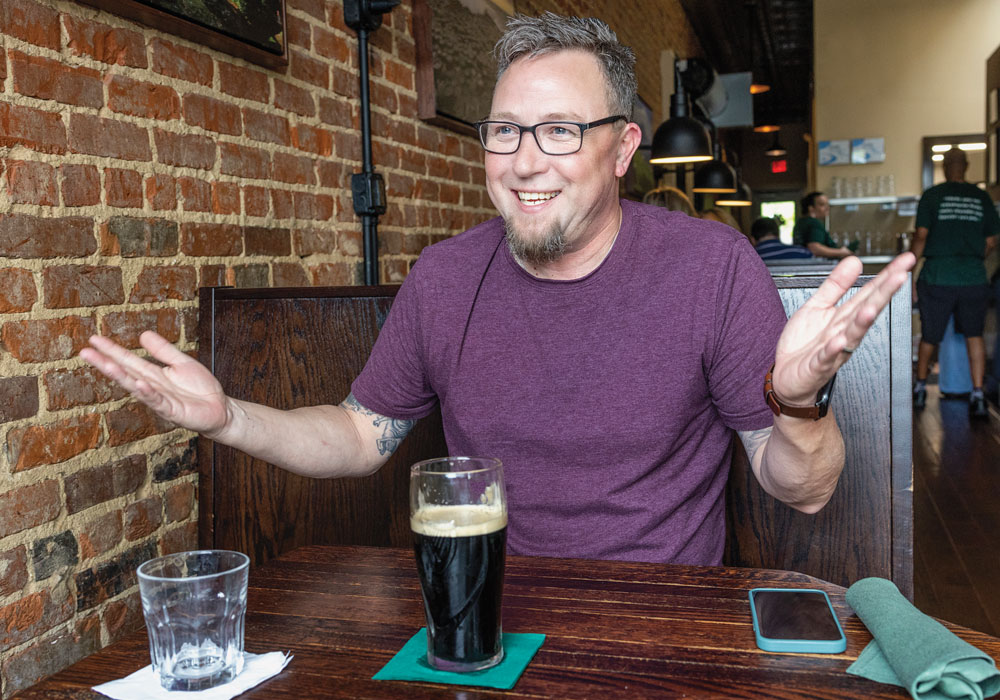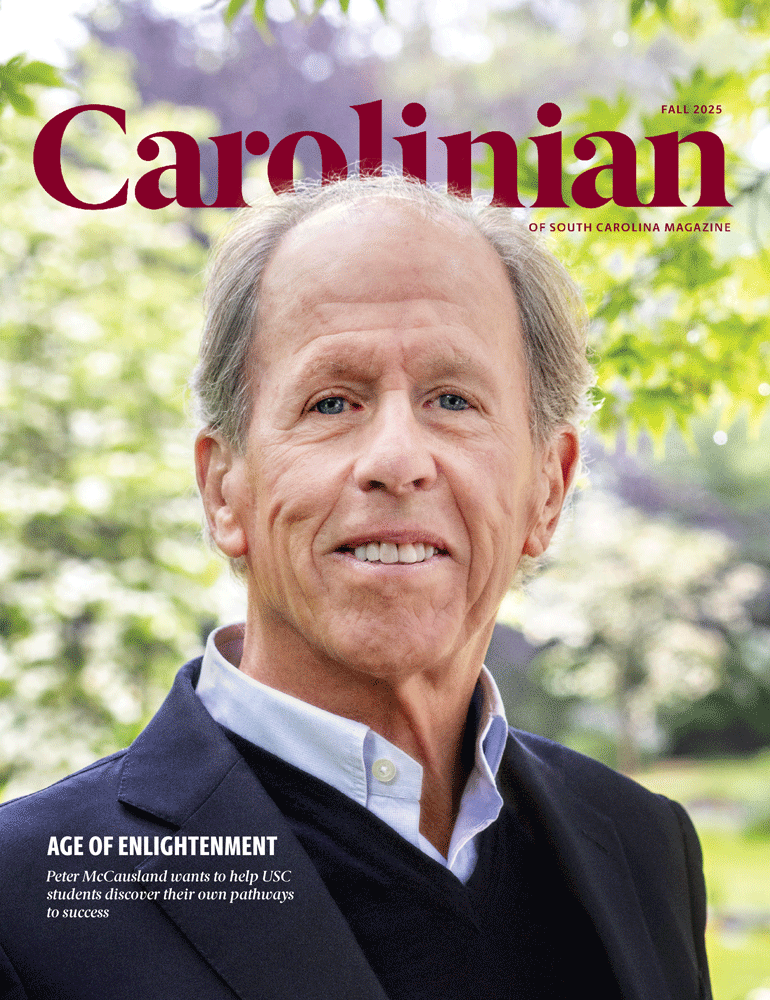Ray McManus wasn’t college material. So said his high school guidance counselor. Ray McManus was a knucklehead. So says McManus himself.
But that was 30 years ago, when the Lexington, South Carolina, native’s work horizon
included bush hogging, cleaning out chicken coops, pulling peanuts and cutting trees.
In the meantime, he cut school, cut up.
He was hardly an A student.
Now, the onetime Knucklehead of Gilbert High holds three degrees from the University
of South Carolina, including an MFA in creative writing and a Ph.D. in English. He
is a professor in the English department at USC Sumter, an academic division chair
and a celebrated poet with three books under his belt, another on
the way.
He’s also one of five Governor’s Award for the Arts recipients for 2023, though that’s jumping ahead. Before he could land the most prestigious arts award in South Carolina, before he would even refer to himself as a poet, McManus had to figure out who he was — as a student, as a person, as a product of the world that shaped him.
At 16, he wasn’t reading Samuel Taylor Coleridge and John Donne. He wasn’t writing sonnets. He was listening to Iron Maiden and Pink Floyd (then punk, then post-punk). He wasn’t taking AP English. He was on the vocational track, small engine repair.
“I thought I’d get to work on Harley-Davidsons because in my 16-year-old mind that would have been the coolest job in the world, right?” McManus chuckles when he recalls his teenage mindset. “Come to find out, no, you’re working on weed eaters and lawn mowers!”
The life lessons didn’t end there. In the version of the Ray McManus Origin Story that spills out over beers at a Main Street Lexington pub, the high school guidance counselor laughed. At him.
And why not? McManus had spent most of high school scheming to start a band, despite
not knowing how to play an instrument. He spent the school day scribbling lyrics in
the margins of his notebooks, dodging trouble or sometimes finding it. Even self-improvement
cut both ways. He chanced upon a copy of Perrine’s Sound and Sense: An Introduction to Poetry during in-school suspension, then stole the book to
keep reading.
“I want to connect. I want to be with people. I want to write about things people think about but are unable to articulate.”
“We had to leave at the end of the day, we were being dismissed, and I’m like, ‘Don’t put this book back on the shelf. You’re never going to find it again,’ so I stole it,” he explains. “And stealing that book of poetry saved my life in a weird kind of way. I spent the next two years reading that book cover to cover.”
Diving into Laurence Perrine’s classic poetry textbook may have helped McManus develop a new appreciation for the written word, but could he really be surprised by the guidance counselor’s surprise that he was suddenly talking college? When she laughed, was he even upset?
“Um, no! As a matter of fact, I needed to hear that!” he says. “I mean, as punk as I was at the time, tell me I can’t do something, or I shouldn’t do something, and I’m just going to be hellbent to do it, you know? So, I dared myself to go to college. Nobody else in my family had ever gone.”
That “dare” began at technical college, where he got up to speed so he could transfer to USC. That meant floundering until he figured out a major, which meant figuring out what he was good at and why it mattered. “There was something that was drawing me to teaching, but I didn’t know what it was,” he says. “I didn’t know why I wanted to do it.”

Teaching English at USC Sumter is a perfect fit for poet Ray McManus “There are a lot of students at USC Sumter that are like me, that were first generation,” he says. “And it’s so fun turning them on to literature, turning them on to poetry, getting them to write.”
He also didn’t really understand poetry. Not yet. Or not fully. But then a USC English professor, Carolyn Matalene, suggested he sign up for Ed Madden’s poetry workshop.
“When I took that, all the sparks flew,” McManus says. “Ed Madden pointed out what I was doing well, what I needed to work on, and in this kind, sweet way that he has, but very honest, very smart.”
Madden also introduced the budding young poet to fellow English professor and poet Kwame Dawes, and the two men became his mentors, encouraging McManus to apply to the MFA program and refine his talents.
“I didn’t even know what an MFA was before that,” he says. “But Ed and Kwame helped me in a brilliant sort of way to find my voice and have confidence in my voice because I was raw, you know. I was angry. I really did have a chip on my shoulder.”
They encouraged him to read widely, to study the craft, to immerse himself in the classics but also contemporary poetry. They also helped McManus realize that the lives he had observed growing up where he did, how he did, were worth examining, the stuff of poetry.
“Probably the most important thing they taught me was how to value community,” says McManus. “There’s an unfortunate stereotype that the poets of the world are elusive and introverted, and, yes, you will find poets like that. But that’s not what I’m interested in. I want to connect. I want to be with people. I want to write about things people think about but are unable to articulate.”
And that's been his path. Over the course of three books — Driving through the country before you are born (2007), Red Dirt Jesus (2011) and Punch. (2014) — McManus has mined his experience and his imagination in equal measure, discovering his own identity as an artist along the way.
“I didn’t want to be thought of as a Southern poet at all,” he says. “When the first book came out, I would do interviews and people were asking me questions about life in the South, living in the South, and for a while it aggravated me because I’m like, ‘Let’s talk about the book.’ Then I realized that’s what they were asking, how growing up in the South informs my work.”
He has since become more comfortable with the tag, though he defines it on his own terms, which means engaging with culturally rooted ideas that run counter to his own values as a Southerner.
His forthcoming collection, The Last Saturday in America (Hub City Press, 2024), began as an exploration of “the performance of masculinity in the South.” But the cultural rift that followed the presidential election of 2016 took his poetry to an even darker place. He was still working on the book — and publishing individual poems in journals along the way — when the pandemic hit.
“It became all about toxic masculinity, sort of this caveman mentality, which didn’t really jive with the way I was brought up, the way I saw the world. It was a lot of angry work,” he says. “And then in 2020 everything just went to hell.”
The world, he means. Not the book. For all the darkness surrounding its inception, The Last Saturday in America evolved into something more hopeful. “It really became a book about connection and connecting with each other,” he says. That same theme underscores McManus’ philosophy as a writer, which he has been refining since he was 16.
“Poetry is for everybody. It has true value to it, whether you understand it or not,” he says. “Reading it, writing it — I think more and more people need to dare themselves to try it. You learn a lot about yourself in the process. You learn a lot about the world around you.”

